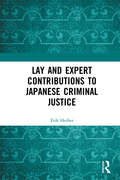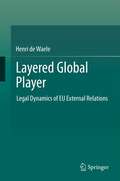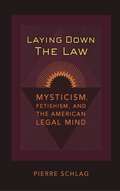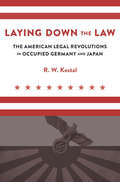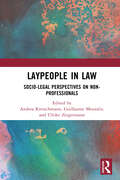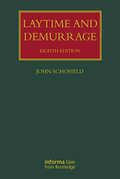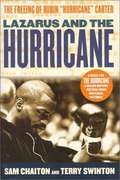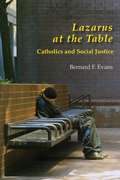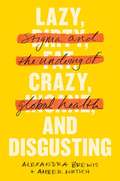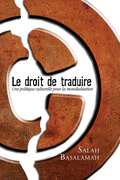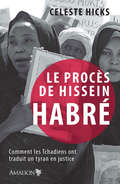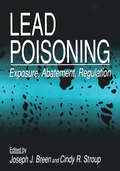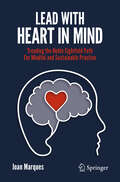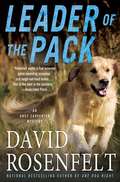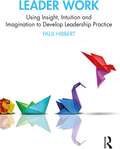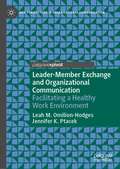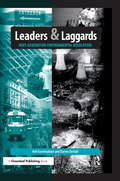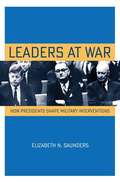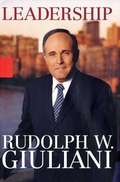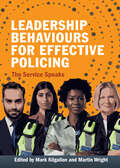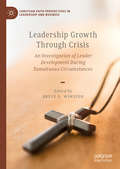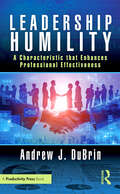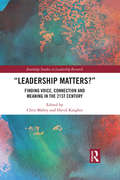- Table View
- List View
Lay Down My Sword and Shield (A Holland Family Novel #1)
by James Lee BurkeVintage James Lee Burke: The first novel introducing the memorable Texas sheriff Hackberry Holland, coming of age against the backdrop of the civil rights era in a sultry border town.In hot and sultry Texas, Hack, an attorney and Korean War POW, is being pushed by his wife, his brother, and his so-called friends in the oil business to run for political office. But Hack would prefer to drink, look after his beloved horses, and represent the occasional long-shot pro bono case at his law firm. When Hack attempts to overturn a conviction for an old army buddy, he finds himself embroiled in the seamy underbelly of the Texas patronage system—and in the earliest beginnings of the United Farm Workers movement, led by a beautiful woman who speaks to his heart in a way no one else has. As Hack begins to bring justice to the underserved, he finds both a new love and a new purpose. With his skillful blend of engaging plotlines, compelling characters, and graceful prose, James Lee Burke demonstrates the shimmering clarity of vision that has made him beloved by suspense fans all over the globe.
Lay and Expert Contributions to Japanese Criminal Justice: Legal Outsiders
by Erik HerberThis book examines the little or not previously researched roles and contributions of non-legal professionals in Japanese criminal justice against the background of recent social and legal changes that either gave birth to or affected the roles played by these "outsiders". On the basis of a wealth of primary and secondary sources, including meeting records of policy makers and practitioners, surveys, interviews and court verdicts, the book zooms in on forensic psychiatrists’ role in the disappearance of criminally insane defendants from Japanese criminal courts; social workers’ new role in diverting a growing number of elderly, mentally disturbed repeat offenders from prison; the therapeutic dimension added to Japanese criminal justice proceedings with the introduction of a system of victim participation as well as the increasingly important role of forensic scientists’ contributions, notably DNA evidence, in Japanese courts. Finally, it examines lay judges’ contributions to sentencing practices as well as how these lay judges make sense of the other outsiders’ contributions. On the basis of very recent social and legal developments the book provides an original contribution to understandings of Japanese criminal justice, as well as more general socio-legal debates on the role of extra-legal knowledge in criminal justice. The book will be of value within BA and MA level courses on and to students and researchers of Japanese law and society as well as comparative criminal justice and socio-legal theory.
Layered Global Player
by Henri De WaeleLayered Global Player offers a concise but thorough overview of the principles of EU external relations law. By closely examining the role of the European Union on the global scene, it aims to provide a systematic overview of the relevant rules and competences, reflecting the legal developments in their historical and political context. The book contains up-to-date analyses of topics such as the Common Foreign and Security Policy, the Common Security and Defence Policy and the Common Commercial Policy. Moreover, it devotes specific attention to the EU's external powers with regard to the environment, fundamental human rights and development cooperation. It also includes a dedicated chapter exploring the relations with neighbouring countries, as well as one that elucidates the complex interplay between rules of domestic, European and international provenance. Overall, this book couples an innovative design with comprehensive coverage and an engaging style of writing. Its compactness and accessibility enable readers to master the main features of this dynamic field of law with ease, making it an indispensible resource for scholars and practitioners alike.
Laying Down the Law: Mysticism, Fetishism, and the American Legal Mind (Critical America #83)
by Pierre SchlagIn the collected essays here, Schlag established himself as one of the most creative thinkers in the contemporary legal academy. To read them one after another is exhilarating; Schlag's sophistication shines through. In chapter after chapter he tackles the most vexing problems of law and legal thinking, but at the heart of his concern is the questions of normativity and the normative claims made by legal scholars. He revisits legal realism, eenergizes it, and brings readers face-to-face with the central issues confronting law at the end of the 20th century.--Choice, May 1997 Pierre Schlag is the great iconoclast of the American legal academy. Few law professors today are so consistently original, funny, and provocative. But behind his playful manner is a serious goal: bringing the study of law into the late modern/ postmodern age. Reading these essays is like watching a one-man truth squad taking on all of the trends and movements of contemporary jurisprudence. All one can say to the latter is, better take cover.--J. M. Balkin, Lafayette S. Foster Professor, Yale Law School At a time when complaints are heard everywhere about the excesses of lawyers, judges, and law itself, Pierre Schlag focuses attention on the American legal mind and its urge to lay down the law. For Schlag, legalism is a way of thinking that extends far beyond the customary official precincts of the law. His work prompts us to move beyond the facile self- congratulatory self-representations of the law so that we might think critically about its identity, effects, and limitations. In this way, Schlag leads us to rethink the identities and character of moral and political values in contemporary discourse. The book brings into question the dominant normative orientation that shapes so much academic thought in law and in the humanities and social sciences. By pulling the curtain on the rhetorical techniques by which the law represents itself as coherent, rational, and stable, Laying Down the Law discloses the grandiose (and largely futile) attempts of American academics to control social and political meaning by means of scholarly missives.
Laying Down the Law: The American Legal Revolutions in Occupied Germany and Japan
by R. W. KostalAfter WWII, U.S. leaders sought to create liberal rule-of-law regimes in Germany and Japan, but the effort was often unsuccessful. Kostal argues that the manifest failings of America’s own rule-of-law democracy were partially to blame, weakening U.S. credibility and resolve and revealing the country’s ambiguous status as a global moral authority.
Laypeople in Law: Socio-Legal Perspectives on Non-Professionals
by Guillaume Mouralis Ulrike Zeigermann Andrea KretschmannThis book contributes to a better understanding of the role laypeople hold in the social functioning of law.It adopts the scholarly insight that the law is unthinkable without an everyday legal understanding of the law pursued by laypeople. It engages with the assumption that not only the law’s existence but also its development is shaped by the layperson’s affirmations, oppositions, ignorance, or negations of the law. This volume thus aims to fill a void in socio-legal studies. Whereas many sociolegal theories tend to conceptualize the law through legal experts’ actions, institutions, procedures, and codifications, it argues that such a viewpoint underestimates the role of laypeople in the law’s processing and advocates for a strengthened conceptual place in socio-legal theory.This book will appeal to socio-legal scholars and sociologists (of law), as well as to legal practitioners and laypersons themselves.
Laytime and Demurrage (Lloyd's Shipping Law Library)
by John SchofieldLaytime and Demurrage is the leading authority for all queries pertaining to this vital aspect of maritime law. It has continued to offer reliable, authoritative, and in-depth analysis since the first edition published in 1986. Praised for its unrivalled coverage and lucid writing style, this book provides a comprehensive overview of all aspects of laytime and demurrage, tracing the development of the law from its origins in the nineteenth century right up to the present day. The author delivers an in-depth analysis of both fixed and customary laytime clauses, the rules relating to commencement of laytime in berth, dock and port charters, and discusses under which circumstances laytime can be suspended. Furthermore, it analyses demurrage rules and vital issues such as despatch, detention and frustration. This seventh edition includes all key judicial and arbitral decisions reported since the sixth edition published in 2011. It also covers suffixes in connection with laytime measured in terms of Working days and Weather Working Days, and disputes arising from tender of NORs at the end of the sea passage. Laytime and Demurrage is an invaluable guide for both legal practitioners and maritime professionals worldwide, including commodity traders and brokers, shipping companies, P&I Clubs, shipowners, charterers, and arbitrators.
Laytime and Demurrage (Lloyd's Shipping Law Library)
by John SchofieldLaytime and Demurrage is the leading authority for all queries pertaining to this vital aspect of maritime law. It has continued to offer reliable, authoritative, and in-depth analysis since the first edition published in 1986. Praised for its unrivalled coverage and lucid writing style, this book provides a comprehensive overview of all aspects of laytime and demurrage, tracing the development of the law from its origins in the nineteenth century right up to the present day. The author delivers an in-depth analysis of both fixed and customary laytime clauses, the rules relating to commencement of laytime in berth, dock and port charters, and discusses under which circumstances laytime can be suspended. Furthermore, it analyses demurrage rules and vital issues such as despatch, detention and frustration. This eighth edition includes all key judicial and arbitral decisions reported since the seventh edition published in 2016. It also covers suffixes in connection with laytime measured in terms of Working days and Weather Working Days, and disputes arising from tender of NORs at the end of the sea passage. Laytime and Demurrage is an invaluable guide for both legal practitioners and maritime professionals worldwide, including commodity traders and brokers, shipping companies, P&I Clubs, shipowners, charterers, and arbitrators.
Lazarus And The Hurricane: The Freeing Of Rubin Hurricane Carter
by Sam Chaiton Terry SwintonThis remarkable true story begins in a Brooklyn ghetto when a group of Canadians meet Lesra, an illiterate black teenager who won their hearts. They bring Lesra to Toronto to help with his education. While learning to read, Lesra finds a copy of Rubin Carter's The Sixteenth Round. Rubin Carter, the subject of Bob Dylan's song "Hurricane", was a #1 middleweight boxing contender who had been wrongfully imprisoned after a white jury found him guilty of the murder of three whites in 1966. A huge public outcry followed the publication of Carter's memoir The Sixteenth Round in 1974, culminating in a retrial, which was a virtual reenactment of the original travesty, with Carter receiving the same triple-life sentence. Inspired by Lesra's passion, his adopted Canadian family made contact with Carter and reinvigorated the legal battle. The Hurricane is the moving story of the eight year struggle Carter and his Canadian friends waged to win his exoneration and freedom.
Lazarus At The Table: Catholic And Social Justice
by Bernard F. Evans"Lazarus at the Table" is the fruit of more than two decades of instructing students in the social teachings of the Catholic Church. For most of these years Bernard Evans has taught graduate students. Lately he also teaches lay Catholics engaged in parish ministry and enrolled in diocesan ministry formation programs. This book is written specifically for the latter group. <P> Evans agrees with the bishops of the United States who insist that any Catholic education that does not include Catholic social teaching is not fully Catholic. And so he writes clearly, concisely, and convincingly about how Catholic social teaching addresses such contemporary issues as human dignity, abortion, assisted suicide and euthanasia, embryonic stem cell research, the death penalty, war, family, marriage, poverty, superfluous income, just wages, unions, peace, solidarity, and many more. Excerpts from the church's official teachings in papal documents abound throughout the book. "Bernard Evans holds the Virgil Michel Ecumenical Chair in Rural Social Ministries at Saint John's School of Theology'seminary, Collegeville, Minnesota. "
Lazy, Crazy, and Disgusting: Stigma and the Undoing of Global Health
by Alexandra Brewis Amber WutichDrawing on the authors' keen observations and decades of fieldwork, Lazy, Crazy, and Disgusting combines a wide array of ethnographic evidence from around the globe to demonstrate conclusively how stigma undermines global health's basic goals to create both health and justice.
Le Droit de traduire: Une politique culturelle pour la mondialisation (Regards sur la traduction)
by Salah BasalamahCet ouvrage étudie les conditions d’émergence historiques et discursives du « droit de (la) traduction » et du droit qui l’administre : le droit d’auteur. Privilégiant une approche essentiellement archéologique, l’auteur montre comment la conception classique de la traduction a joué un rôle sensible dans la formation du discours juridique qui a contribué à l’avènement de l’auteur et de son droit tels que conçus aujourd’hui. L’auteur examine les implications culturelles, politiques et éthiques du droit de traduire, surtout pour les pays en développement, engageant par là une perspective postcoloniale. Soucieuse d’une meilleure diffusion du patrimoine culturel mondial, la politique du droit de traduire qu’il propose n’interroge pas seulement le droit d’auteur comme catalyseur de la marchandisation de la production intellectuelle, mais également le droit international comme instrument de l’impérialisme culturel de la mondialisation. Conçu désormais hors du champ juridique traditionnel mais plutôt dans celui d’une résistance politique, l’auteur démontre comment le droit de traduction devient alors un « droit à la traduction ». Publié en français
Le procès de Hissein Habré: Comment les Tchadiens ont traduit un tyrant en justice
by Celeste HicksLa condamnation de Hissein Habré pour crimes contre l'humanité a été décrite comme "un tournant pour la justice des droits humains en Afrique et au-delà". Pour la première fois, un criminel de guerre africain était condamné sur le sol africain. Pour avoir, dès le début, suivi le procès et interrogé de nombreuses personnes impliquées, la journaliste Celeste Hicks raconte la remarquable histoire de la manière dont Habré a été traduit en justice. Sa condamnation fait suite à une campagne héroïque de 25 ans menée par des militants et des survivants des atrocités de Habré qui a abouti, malgré l'indifférence internationale, l'opposition des alliés de Habré et plusieurs tentatives infructueuses de le traduire en justice en Europe et ailleurs. Face à de telles difficultés, la condamnation d'un dirigeant, autrefois intouchable, représente un tournant majeur, et a de profondes implications pour la justice africaine et l'avenir de l'activisme pour les droits humains dans le monde.
Lead Poisoning: Exposure, Abatement, Regulation
by Joseph J. Breen Cindy R. StroupLead Poisoning discusses one of the most critical and preventable environmentally induced illnesses. The actual toll lead poisoning takes on society cannot be measured fully due to the "silent" nature of health effects, such as subtle intellectual deficits and neurological damage, caused by chronic low-level exposures. This book covers every major topic on the subject, including lead poisoning in children, sources of contamination, state-of-the-art sampling and analytical measurement methods, the newest studies on low-cost abatement methods, and much more. This reference is the most comprehensive presentation of issues currently available under one cover.The text is divided into three major parts. Part I provides insights from studies assessing lead exposures from paint, dust, soil, and lead battery recycling operations. The second part is a unique collection of strategic federal policy statements from the U.S. EPA, HUD, and HEW-CDC. It details the National Implementation Plan as well as a local government's efforts to provide low-cost effective risk communication and public outreach to the community. The next part offers seven chapters on analytical issues in the measurement of lead in blood, paint, dust, and soils. Part IV, Sampling Methods and Statistical Issues, rounds out the technical portion of the volume. The relationships among lead levels in biological and environmental media are investigated and the interpretive problems discussed. The use of multi-element analysis of environmental samples as an approach to investigate sources is described.The book finishes with its most unique feature-OPPT's Check Our Kids for Lead Program, one organization's effort to empower its employees to make a personal difference in confronting the problem of lead poisoning in children. The Program serves as a model for other government organizations (federal, state, and local), university and community organizations, and corporations to educate them and take personal and corporate responsibility for addressing this important and environmental health problem.
Lead with Heart in Mind: Treading the Noble Eightfold Path For Mindful and Sustainable Practice
by Joan MarquesThis enlightening and inspiring book shows both accomplished and aspiring leaders how to harness Buddhist philosophies to practice more effective and sustainable leadership. Illustrated through the stories of visionary and innovative leaders in many fields, including Elon Musk (Tesla), Malala Yousafzai (human rights), Howard Schultz (Starbucks), and Muhammad Yunus (microfinance and development), this volume links an ancient Buddhist concept, known as the Noble Eightfold Path, to contemporary needs to develop an alternative paradigm to the excessive bottom-line focus and winner-take-all approach that has come to dominate leadership practice in recent decades. The stunning rejection by the United Kingdom of the European Union and the divisive US presidential race of 2016 serve as a dramatic backdrop to complex social issues that require creative solutions bringing together stakeholders from different fields and points of view. The Eightfold Path—characterized by the following elements: Right View, Right Intention, Right Speech, Right Action, Right Livelihood, Right Effort, Right Mindfulness, and Right Concentration—is an approach to leadership that balances individual and collective concerns while aligning pragmatic and spiritual priorities.Joan Marques, an accomplished author, speaker, and educator on spirituality in organizations, with extensive experience in teaching and applying Buddhist principles, demonstrates how the Eightfold Path can inform practices and decisions that result in long-term communal benefits, and, in the process, develop more mindful and conscientious leaders capable of tackling multifaceted challenges.
Leader Of The Pack (Andy Carpenter #10)
by David RosenfeltOver the course of his legal career, Andy Carpenter has lost a few cases. But that doesn't mean he forgets his clients. Andy has always been convinced that Joey Desimone, a man convicted of murder nine years ago, was innocent and believes that Joey's family's connections to organized crime played a pivotal role in his conviction. While there isn't much Andy can do for him while he serves out his prison sentence, Joey suggests that he check up on Joey's elderly uncle. He'd rather not, but as a favor to Joey, Andy agrees to take his dog, Tara, on a few visits. The old man's memory is going, but when Andy tries to explain why he's there, it jogs something in the man's mind, and his comments leave Andy wondering if Uncle Nick is confused, or if he just might hold the key to Joey's freedom after all this time. Andy grabs on to this thread of possibility and follows it into a world where the oath of silence is stronger than blood ties, and where people will do anything to make sure their secrets are kept. Riveting, suspenseful, and highly entertaining, Leader of the Pack is bestseller David Rosenfelt's latest entry in his much-beloved Andy Carpenter series.
Leader Work: Using Insight, Intuition and Imagination to Develop Leadership Practice
by Paul HibbertLeader Work offers an accessible and engaging introduction to the power of reflection to support leaders in their development and professional practice. The book does not present a tick-box toolkit to being a better leader, instead it provides the prompts and deeper reflexive space for leaders to consider their own self-development.Written by a leading management researcher and consultant, the book draws on reflexive practice, but goes beyond this method to guide the reader on how to consider both inward and outward work, and provides useful suggestions for application. The inward work involves developing our knowledge of ourselves, our capabilities and our limitations through self-examination and connecting with others, and so building up our capacity for judgment, and gaining confidence in using intuition and imagination thoughtfully in situations of complexity and uncertainty. The outward work involves learning to express a leader identity that is both true to ourselves and recognized by relevant groups and the organizations in which we work, so that we are trusted to help navigate and narrate a path through uncertainty.This book has been written for leaders and would-be leaders looking to develop and shape their practice, as well as scholars studying and teaching leadership classes.
Leader-Member Exchange and Organizational Communication: Facilitating a Healthy Work Environment (New Perspectives in Organizational Communication)
by Leah M. Omilion-Hodges Jennifer K. PtacekIt is hard to overstate the importance of the leader-member exchange relationship. Employees who share a high-quality relationship with their leader are more likely to earn a higher salary, climb the ranks more quickly, and report higher life satisfaction levels than their peers who have a less copasetic leader-member relationship. While Leader-Member Exchange Theory (LMX) research addresses the impact that the leader-member relationship has on the individual employee experience, much of this scholarship overlooks or obscures the vital role that communication plays in the development and maintenance of workgroup relationships. Much of extant literature also glosses over the role that communication plays in workgroup collaboration. Using a communicative lens, this text illustrates the complex theoretical underpinnings of LMX theory, such as the importance of social interaction and relationship building and maintenance necessary to achieve organizational goals. We explore how an employee’s relationship with their leader also shapes their peer relationships and their overall standing within their workgroup. Further, the text examines the potential dark side of LMX theory, such as the tendency towards demographic and trait and state similarity. Employing a communicative perspective emphasizes the extent of position and personal power both leaders and members have in engineering the quality of the relationship they desire. Integrating and applying once disparate lines of academic literature, this book offers employees, students, and teacher-scholars pragmatic yet research-based insights into developing and maintaining successful, healthy workplace relationships.
Leaders and Laggards: Next-Generation Environmental Regulation
by Darren Sinclair Neil GunninghamConsensus is growing internationally that traditional command-and-control approaches to environmental regulation have borne much of their low-hanging fruit. Yet it is far from clear what should complement or replace them. Regulatory agencies and policy-makers are struggling with a lack of information about regulatory reform, about what works and what doesn't, and about how best to harness the resources of both government and non-government stakeholders. Progress is being impeded unnecessarily by a lack of shared knowledge of how similar agencies elsewhere are meeting similar challenges and by a lack of data on the success or otherwise of existing initiatives. Despite recent and valuable attempts to deal with such problems in the European Union and North America, these remain islands of wisdom in a sea of ignorance. For example, when it comes to dealing with small and medium-sized enterprises, very little is known, and what is known is not effectively distilled and disseminated. Much the same could be said about the roles of third parties, commercial and non-commercial, as surrogate regulators, and more broadly of many current initiatives to reconfigure the regulatory state. Based on the authors' work for the OECD, Victorian Environmental Protection Authority and the Western Australian Department of Environment Protection, Leaders and Laggards addresses these problems by identifying innovative regulatory best practice internationally in a number of specific contexts, evaluating empirically the effectiveness of regulatory reform and providing policy prescriptions that would better enable agencies to fulfil their regulatory missions. Focusing primarily on the differing requirements for both corporations and small and medium-sized enterprises in North America and Europe, the book aims to complement existing initiatives and to expand knowledge of regulatory reform by showing: how existing experience can best be put to practical use "on the ground"; by drawing lessons from experiments in innovative regulation internationally; by reporting and extrapolating on original case studies; and by advancing understanding on which instruments and strategies are likely to be of most value and why. The authors argue that the development of theory has outstripped its application. In essence, Leaders and Laggards aims to ground a myriad of theory on the reinvention of environmental regulation into practice. The book will be essential reading for environmental policy-makers, regulatory and other government officials responsible for policy design and implementation, academics and postgraduate students in environmental management, environmental law and environmental policy, and a more general readership within environmental policy and management studies. It will also be of interest to those in industry, such as environmental managers and corporate strategists, who are considering the use of more innovative environmental and regulatory strategies, and to environmental NGOs.
Leaders at War: How Presidents Shape Military Interventions
by Elizabeth N. SaundersOne of the most contentious issues in contemporary foreign policy—especially in the United States—is the use of military force to intervene in the domestic affairs of other states. Some military interventions explicitly try to transform the domestic institutions of the states they target; others do not, instead attempting only to reverse foreign policies or resolve disputes without trying to reshape the internal landscape of the target state. In Leaders at War, Elizabeth N. Saunders provides a framework for understanding when and why great powers seek to transform foreign institutions and societies through military interventions. She highlights a crucial but often-overlooked factor in international relations: the role of individual leaders. Saunders argues that leaders' threat perceptions—specifically, whether they believe that threats ultimately originate from the internal characteristics of other states—influence both the decision to intervene and the choice of intervention strategy. These perceptions affect the degree to which leaders use intervention to remake the domestic institutions of target states. Using archival and historical sources, Saunders concentrates on U.S. military interventions during the Cold War, focusing on the presidencies of Eisenhower, Kennedy, and Johnson. After demonstrating the importance of leaders in this period, she also explores the theory's applicability to other historical and contemporary settings including the post–Cold War period and the war in Iraq.
Leadership
by Ken Kurson Rudolph W. GiulianiHaving inherited a city ravaged by crime and crippled in its ability to serve its citizens, Giuliani shows how he found that every aspect of his career up to that point-from clerking for the formidable judge who demanded excellence (and rewarded it with a lifetime of loyalty) to busting organized crime during his years as a federal attorney -shaped his thinking about leadership and prepared him for the daunting challenges ahead. Giuliani's successes in turn strengthened his conviction about the core qualities required to be an effective leader, no matter what the size of the organization, be it an international corporation or a baseball team. In detailing his principles of leadership, Giuliani tells captivating stories that are personal as well as prescriptive.
Leadership Behaviours for Effective Policing: The Service Speaks
by Martin Wright Mark KilgallonAn essential handbook of policing leadership behavioural skills for both professional police officers and policing students aspiring to join the force. The behaviours examined are of relevance to all ranks and roles, from a newly appointed police constable to an executive officer.Behavioural soft skills are essential to effective policing practice and professional development, and are particularly significant in leadership and management roles. This handbook examines the key leadership behaviours and focuses on discreet aspects within policing as well as describing a career timeline. In addition it provides a unique opportunity for leaders to articulate the effects the Covid-19 pandemic has had on law enforcement, examining the impact on policing behaviours and what the blockages are.Each chapter is written by a well-established serving police leader or policing scholar, bringing together a wealth of experience and understanding and applying this knowledge in context through key case studies and examples. It bridges the gap between theory and practice so readers can apply what they have learnt to their policing roles and effectively formulate and describe their own leadership philosophy and style.This is a companion book to Behavioural Skills for Effective Policing.
Leadership Growth Through Crisis: An Investigation of Leader Development During Tumultuous Circumstances (Christian Faith Perspectives in Leadership and Business)
by Bruce E. WinstonThis edited collection uses a biblical lens to explore how to lead effectively and grow in a crisis situation. The chapters examine topics such as communicating through crisis, developing organizations and leaders through crisis, personal crisis and leadership development, and ethics and morality in crisis. Case studies include David's response to Goliath's challenge, Joseph's leadership and management of Egypt, and the team leadership and resilience of Esther and Mordecai in navigating a possible Jewish genocide.This book makes a unique contribution to the crisis leadership literature by examining the topic from a Christian perspective and will foster future research into the role of spirituality in organizational crisis.
Leadership Humility: A Characteristic that Enhances Professional Effectiveness
by Andrew J. DuBrinThis book deals in depth with an ancient attribute of effective leaders that has in recent years caught the attention of leadership writers and researchers. Today’s effective leader is expected to demonstrate humility in addition to standard leadership attributes such as self-confidence, high-level cognitive skills, creativity, charisma, and the ability to articulate visions. The theme of this book is that leadership and professional effectiveness are enhanced when interspersed with other key leadership attributes including those mentioned above, assertiveness, a sense of humor, and strategic thinking ability. Many brash and aggressive successful leaders would be even more successful if they sprinkled their leadership approach with humility.This book describes an opinion about the most relevant aspects of humility as it applies to leadership and professional effectiveness, yet the emphasis is on leadership. Equally important, each chapter contains suggestions for making better use of humility. Humility as it relates to leadership and professional effectiveness is covered from many angles. Among these topics are the many meanings and components of humility and how leadership humility impacts group member performance and behavior. We also describe the attributes of humble leaders and professionals and their type of interpersonal relationships. Servant leadership, because of its tie-in with humility, receives a separate chapter.A description is provided about how narcissism, hubris, and charisma can be blended with humility to improve leadership effectiveness. Two other key topics are developing and enhancing your humility and making effective use of humility in leadership and professional life. The major contribution of this book is its systematic presentation of applied information about humility related to leadership effectiveness, such as the impact of humility on job performance and employee behavior, and how humility is part of servant leadership. At the same time, the book provides practical guidelines for applying the information to make optimum use of humility in the workplace.
Leadership Matters: Finding Voice, Connection and Meaning in the 21st Century (Routledge Studies in Leadership Research)
by Chris Mabey David KnightsIn recent years we have seen what could be described as a moral meltdown in the corporate corridors of power. Few sectors have escaped high profile scandals, with public officials and leaders guilty of malpractice, duplicity, fraud and corporate malfeasance. Conventional leadership theories appear to be inadequate to equip those with power to act ethically and responsibly. At a more macro level, many of the social and environmental problems we face in the 21st century could in fact, be described as spiritual in nature, rooted in a flawed human condition. Leadership Matters brings together an eclectic mix of authors of different faith traditions, to explore what this spiritual and cultural transformation might look like. For too long we have relied on external codes of conduct, which are, at best, blunt instruments for creating ethical practice. So, chapter by chapter, this book examines our interior lives from the perspective of mind, body and soul. The unashamed premise of this book is that true and influential leadership comes from the inside with each chapter presenting what it means to lead respectfully, critically, responsibly and humbly in the gritty reality of the twenty first century workplace. This volume will be of keen interest to academics and practitioners in the field of leadership and the related disciplines.

